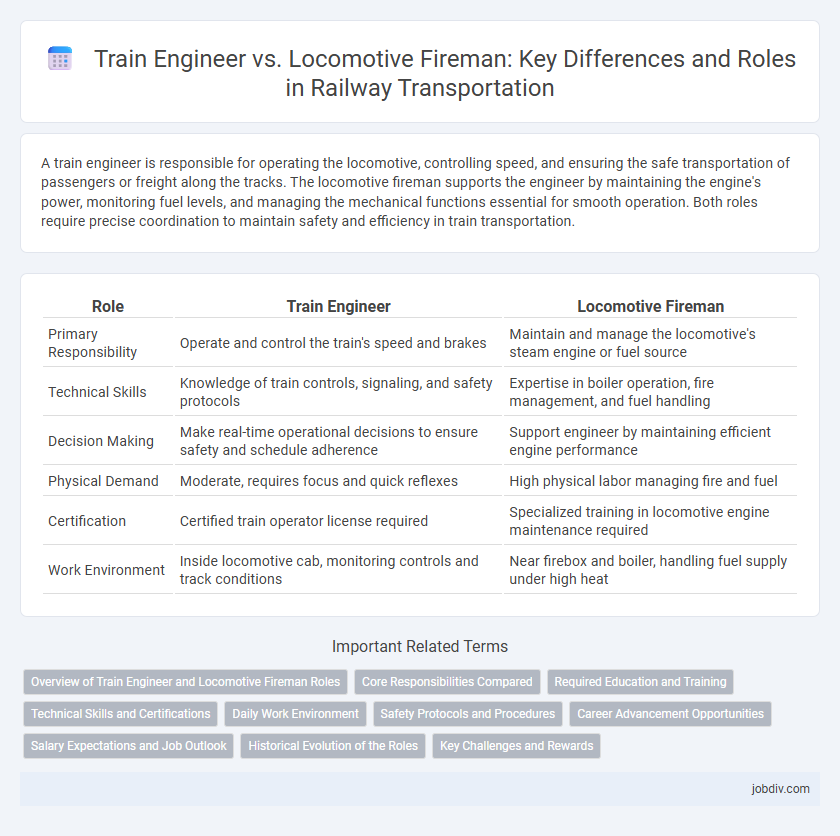A train engineer is responsible for operating the locomotive, controlling speed, and ensuring the safe transportation of passengers or freight along the tracks. The locomotive fireman supports the engineer by maintaining the engine's power, monitoring fuel levels, and managing the mechanical functions essential for smooth operation. Both roles require precise coordination to maintain safety and efficiency in train transportation.
Table of Comparison
| Role | Train Engineer | Locomotive Fireman |
|---|---|---|
| Primary Responsibility | Operate and control the train's speed and brakes | Maintain and manage the locomotive's steam engine or fuel source |
| Technical Skills | Knowledge of train controls, signaling, and safety protocols | Expertise in boiler operation, fire management, and fuel handling |
| Decision Making | Make real-time operational decisions to ensure safety and schedule adherence | Support engineer by maintaining efficient engine performance |
| Physical Demand | Moderate, requires focus and quick reflexes | High physical labor managing fire and fuel |
| Certification | Certified train operator license required | Specialized training in locomotive engine maintenance required |
| Work Environment | Inside locomotive cab, monitoring controls and track conditions | Near firebox and boiler, handling fuel supply under high heat |
Overview of Train Engineer and Locomotive Fireman Roles
Train Engineers operate and control the locomotive, ensuring safe and efficient train movement by managing speed, braking, and signaling systems. Locomotive Firemen support the engineer by maintaining the engine's mechanical functions, monitoring fuel and steam pressure, and assisting with operational tasks during the journey. Both roles require expertise in railway safety protocols and coordination to maintain smooth train operations.
Core Responsibilities Compared
Train engineers operate and control the locomotive, ensuring safe and efficient train movement by monitoring instruments, managing speed, and following signals. Locomotive firemen primarily assist with maintaining the engine's mechanical functions, such as managing fuel supply, monitoring boiler pressure, and observing engine performance to prevent malfunctions. Both roles require coordination to ensure operational safety and effective train performance, with engineers focusing on navigation and control, while firemen handle engine support and maintenance tasks.
Required Education and Training
Train engineers typically require a high school diploma or equivalent, followed by extensive on-the-job training and certification from the Federal Railroad Administration (FRA). Locomotive firemen often start with similar educational backgrounds but receive more focused training in steam locomotive maintenance and safety procedures. Both roles demand comprehensive knowledge of railroad operations, though engineers undergo more rigorous technical and operational training to attain certification.
Technical Skills and Certifications
Train Engineers must possess advanced technical skills in operating, controlling, and maintaining complex locomotive systems, often requiring certifications such as the Federal Railroad Administration (FRA) Engineer Certification. Locomotive Firemen typically require expertise in monitoring boiler pressures and fuel systems, though their role has largely evolved, with fewer formal certifications needed compared to engineers. Both positions demand strong mechanical knowledge, but Train Engineers typically undergo more rigorous training and possess a broader range of operational certifications.
Daily Work Environment
Train Engineers operate locomotives, controlling speed, braking, and compliance with safety regulations within the cab environment, often using advanced digital controls and communication systems. Locomotive Firemen focus on monitoring and maintaining fuel and steam pressure, ensuring efficient engine performance, typically working in more physically demanding conditions near the boiler. Both roles require constant attention to track signals and weather conditions, but Engineers engage more with navigation and signaling systems, while Firemen manage the mechanical aspects of locomotive operation.
Safety Protocols and Procedures
Train engineers implement advanced safety protocols by continuously monitoring train controls and communication systems to prevent accidents and ensure smooth operations. Locomotive firemen focus on maintaining optimal boiler pressure and fuel levels, following strict procedures to avoid engine malfunctions and fire hazards. Both roles require rigorous adherence to safety regulations, coordinated emergency response training, and meticulous inspection routines to uphold overall rail safety.
Career Advancement Opportunities
Train engineers have broader career advancement opportunities due to their responsibility for operating and controlling the train, often progressing to supervisory or management roles within railroad companies. Locomotive firemen typically begin by assisting engineers and can advance to engineer positions after gaining sufficient experience and training. Both roles require technical expertise, but engineers generally have more pathways for growth and higher earning potential in the transportation industry.
Salary Expectations and Job Outlook
Train Engineers typically earn an average annual salary ranging from $60,000 to $90,000, reflecting higher responsibility in operating and controlling trains. Locomotive Firemen, often serving as assistants to engineers, have salary expectations around $40,000 to $55,000, with roles focusing on monitoring and maintaining equipment. Job outlook for Train Engineers shows steady growth due to advancements in rail technology, while Locomotive Firemen positions face gradual decline as automation reduces manual tasks.
Historical Evolution of the Roles
The roles of Train Engineer and Locomotive Fireman originated during the steam locomotive era, with the Fireman responsible for managing the engine's fire and steam pressure to ensure optimal performance. Over time, technological advancements such as diesel and electric locomotives reduced the physical demands on the Fireman, leading to the consolidation of responsibilities under the Train Engineer. This historical evolution reflects the transition from manual operation and maintenance to automated systems, reshaping workforce requirements in the rail transportation industry.
Key Challenges and Rewards
Train engineers face key challenges such as maintaining precise control of high-speed trains and ensuring passenger safety under varying weather and track conditions. Locomotive firemen manage critical tasks like monitoring boiler pressure and maintaining optimal steam production, demanding constant vigilance and physical endurance. Both roles reward workers with a unique sense of responsibility for transportation efficiency and contribute significantly to the safe and timely delivery of goods and passengers.
Train Engineer vs Locomotive Fireman Infographic

 jobdiv.com
jobdiv.com